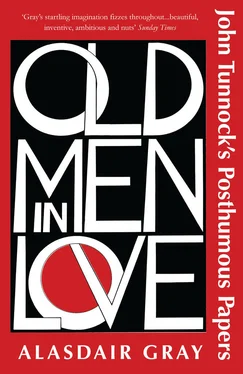Yes; in the church; lounging on a red sofa, near a bright fire, in the coloured light of a high lancet window filled with rich stained glass; soft cushions beneath my feet; a billiards table on my right; oak panelling round the walls; and above my head the sacred symbol of the Lamb and Dove, flanked and supported by a rack of billiard cues. This room, I knew, was that in which the Great Manifestation had taken place; that mystic rite through which living flesh is said to have been reconciled to God. Lovely to the eye, calming to the heart, this chamber was, and is. A rich red Persian carpet covered the floor, in contrast with the brown oaken roof. Red curtains draped the windows, the glass in which was painted a mystical device, a lamb, a lion and a dove — the lion standing on a bed of roses, with a banner on which these words are inscribed,
OH, HAIL, HOLY LOVE!
The chimneypiece was a fine oak frame of Gothic work, let in with mirrors. A harp stood in one corner of the room; a large euterpean in another. 49A few books, not much used, lay on the tables — Young’s Night Thoughts , a Turner Gallery , Wordsworth’s Greece and a few more. Ivory balls lay on the green baize as if the Sisters had been recently at play. The whole room had in it a hush and splendour which affected the imagination with a kind of awe. How could I help thinking of that mystic drama in which Brother Prince had played the part of hero, “Madonna” Paterson the part of heroine? I was suddenly surprized by the feeling of being closely watched from very near. Yes! A face was pressed against the lowest part of a window opposite, the face of a small child with large, sad, questioning eyes. It disappeared as the First Anointed One returned.
“Do you work and play on Sundays?” I enquired.
“We have no Sundays,” he replied; “all days with us are Sabbaths, and everything we do is consecrated to the Lord. Will you now come in to see Brother Prince?”
“Oh, yes,” I answered softly; and the keeper of the Seven Stars and the Seven Golden Candlesticks led the way.
“Good day sir; I am glad to see you; take this chair,” said a gentleman in black, with sweet, grave face, a broad white neckcloth, and shining leather shoes. He had come to meet me at the door; he led me quietly into a luxurious parlour, and seated me in an easy chair beside the fire. The room was like a lady’s boudoir; the furniture was rich and good; the chairs were cosy; and the ornaments were of the usual kind. I had come to Spaxton from a country house; and nothing in the room appeared to be much unlike what I had left behind, except the men and women.
Prince sat in a semicircle of his elect; one brother and two sisters on either side, the Rev. Samuel Starky on the far left, the Rev. George R. Thomas on the far right. Starky, eldest and whitest of my seven hosts was a tall, stout man of sixty-one years, with mild blue eyes, a little weak and wandering in expression. His name was well known in these Somerset dales and woods, among the gentry of which the Starkys had always held their heads very high. Next to Starky were Sister Ellen and Sister Zoe; next to Thomas were Sister Annie and Sister Sarah. Two of the four ladies would have been thought comely in any place and one was very lovely. Sister Annie was a fine model of female beauty in middle life; plump, rosy, ripe; with a pair of laughing eyes, a full red cheek, and ripples of curling dark brown hair. Some softness of the place lay on her as on all the rest; hush in her movement, waiting in her eyes, silence on her lips. She was the only woman I saw at Spaxton who seemed in perfect health.
The second lady, Sister Zoe, was one of those rare feminine creatures who lash poets into song, who drive artists to despair, and cause common mortals to risk their souls for love. You saw, in time, that the woman was young, and lithe, and dressed in the purest taste; but you could not see all this at once; for when you came into her presence you saw nothing save the whiteness of her brow, the marble-like composure of her face, the wondrous light of her big blue eyes. She sat there, nestling by the side of Prince; in a robe of white stuff, with violet tags and drops, the tiny streaks of colour throwing out into relief the creamy paleness of her cheek. But for the gleaming light in her eye, Guercino might have painted her as one of his rapt and mourning angels. I do not know that I have ever seen a face more full of high, serene, and happy thoughts; yet gazing on her folded hands and saintly brows, an instinct in my blood compelled me, much against my will, to think of her in connection with that scene which had taken place in the adjoining church; the strangest mystery, perhaps the darkest iniquity of these days; through which Prince asserts, and Thomas testifies, that God has reconciled living flesh unto Himself. Of the other two ladies I shall only say that Sister Sarah is young and tall, and Sister Ellen about fifty-five years old. I was not told what names these ladies had been called in the world outside.
Wishing to learn if Sister Zoe and “Madonna” Paterson were one, I asked by what name I should speak to her.
“Zoe,” she replied.
“But think,” I urged; “I am a stranger; how can I use that sweet, familiar name?”
“Pray do so,” answered Zoe; “it is very nice.”
“No doubt; if I were here a month; meantime it would be easier for me to call you Miss — ”
“Call me Zoe,” she answered with a patient smile, “Zoe; nothing but Zoe.”
Looking toward Prince I said, “Do your people take new names on coming into residence, like the monks and nuns of an Italian convent?”
“Not like monks and nuns,” said Prince; “we do not put ourselves under the protection of our saints. We have no saints. We simply give ourselves to God, of whom this mansion is the seat. At yonder gates we leave the world behind; its words, its laws, its passions; all of which are things of the Devil’s kingdom. Living in the Lord, we follow His leading light, even in the simple matter of our names. They call me Belovéd. I call this lady Zoe, because the sound pleases me. I call Thomas there Mossoo, because he speaks French so well.”
I never got beyond this point with the Saints. When bidding them goodbye I said to Zoe, holding her hand in mine, “May I not hear some word to know you by when I am far away?”
“Yes; Zoe,” she said, and smiled.
“Zoe. . what else?”
Her thin lips parted as if to speak. Was the name that rose to her lips. . Paterson? Who knows? With her fingers linked in mine she turned to Prince, and whispered in melting tones, “Belovéd!” Prince told me in a voice of playful softness; “She is Zoe; you must think of her as Zoe; nothing else.”
The gentleman called Belovéd by his followers is fifty-six years old, spare in person with the traces of much pain and weariness on his pale cheek. His face is very sweet, his manner very smooth, his smile very soft and the key of his voice is low. He has about him something of a woman’s grace and charm, and in his eyes which were apt to close, you seemed to see a light from some other sphere. As we sat before his warm and cheery fire he seemed at once rapt into his own dreams. When the sound of voices roused him he crossed his hands upon his black frock, 50put his shiny shoes on the rug and bore a luxurious part in a long, singular conversation.
“You hold,” I asked him, “ that the day of grace is past?”
“We know it is; the day of judgement is at hand.”
“You expect the world to pass away?”
“The old world is no more. God has withdrawn us from it.”
“How many are you in the Abode?”, I asked.
“About sixty souls in all.”
At this moment a manservant, dressed in sober black came into the room. I said, “You count the domestics in that number?”
Читать дальше












